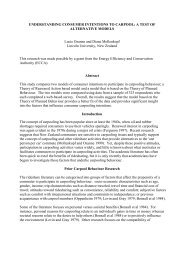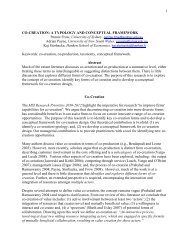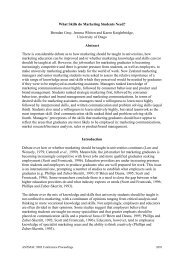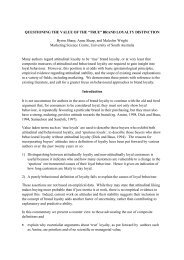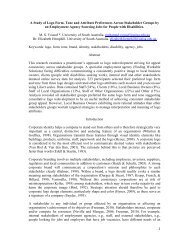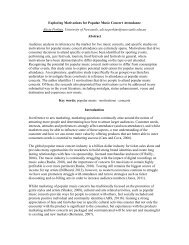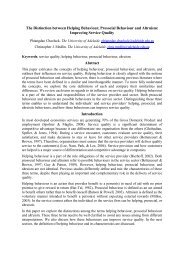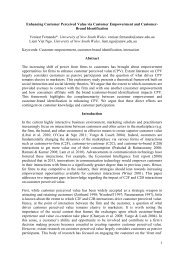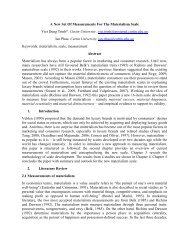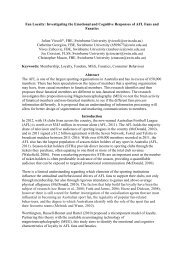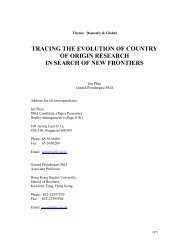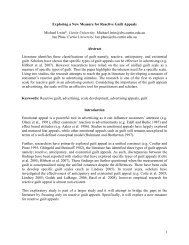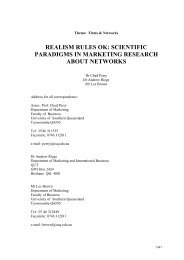The Chinese Concepts of Guanxi, Mianzi, Renqing and ... - ANZMAC
The Chinese Concepts of Guanxi, Mianzi, Renqing and ... - ANZMAC
The Chinese Concepts of Guanxi, Mianzi, Renqing and ... - ANZMAC
Create successful ePaper yourself
Turn your PDF publications into a flip-book with our unique Google optimized e-Paper software.
not solely commercial, but also social, involving the exchange <strong>of</strong> renqing <strong>and</strong> the giving <strong>of</strong><br />
mianzi (Luo, 1997b).<br />
Yang (1992) distinguished three groups <strong>of</strong> <strong>Chinese</strong> relationships: (1) jiajen (family members),<br />
shoujen (relatives outside the family, friends, neighbours, classmates, <strong>and</strong> colleagues), <strong>and</strong><br />
shengjen (strangers). <strong>The</strong>se distinctions are consistent with Hwang’s (1987) conception <strong>of</strong> the<br />
three major guanxi categories in <strong>Chinese</strong> societies.<br />
Chang <strong>and</strong> Holt (1991) identified four common methods that one might establish guanxi with<br />
another: (1) appealing to kin relations; (2) pointing to a previous association; (3) using ingroup<br />
connections or mediators; or (4) social interaction requiring social skills such as the<br />
ability to play the “renqing (favour) game”.<br />
Empirical evidence suggested that guanxi-based business variables have pr<strong>of</strong>ound <strong>and</strong><br />
positive impacts on the efficiency <strong>and</strong> growth <strong>of</strong> companies doing business in China (e.g., see<br />
Luo, 1997a; Luo <strong>and</strong> Chen, 1997; So <strong>and</strong> Speece, 2000).<br />
<strong>The</strong> <strong>Chinese</strong> Concept <strong>of</strong> <strong>Mianzi</strong><br />
While it is argued that face behaviour is universal, the concept <strong>of</strong> face is <strong>Chinese</strong> in origin <strong>and</strong><br />
is a literal translation <strong>of</strong> the Chinse terms <strong>of</strong> mianzi <strong>and</strong> lian (G<strong>of</strong>fman, 1955; Ho, 1976). Hu<br />
(1944, p. 45-46) made very clear distinctions between the two <strong>Chinese</strong> words for “face”: lien<br />
(or lian) <strong>and</strong> mien (or mian):<br />
“Of the two words for ‘face’: lien <strong>and</strong> mien, the latter is by far the older, being found<br />
in ancient literature. Mien has acquired a figurative meaning referring to the relation<br />
between ego <strong>and</strong> society as early as the fourth century B.C. Lien is a more modern<br />
term, the earliest reference cited in the K’ang-hsi Dictionary dating from the Yuan<br />
Dynasty (1277-1367). This word seems to have originated somewhere in North China<br />
<strong>and</strong> gradually to have supplanted mien in the physical sense, <strong>and</strong> also to have acquired<br />
some <strong>of</strong> its figurative meaning. Meanwhile, mien, with the meaningless syllable –tzu<br />
(zi) attached, had developed different connotations”.<br />
On the physical level, both lian <strong>and</strong> mian(zi) mean the physical “face”. On the connotative<br />
level, mianzi st<strong>and</strong>s for the kind <strong>of</strong> prestige or reputation achieved through getting on in life,<br />
through success <strong>and</strong> ostentation; mianzi is accumulated by means <strong>of</strong> personal effort or clever<br />
maneuvering. <strong>Mianzi</strong> is therefore a kind <strong>of</strong> recognition ego dependent on the external<br />
environment. Lian is the respect <strong>of</strong> the group for a man with a good moral reputation; it<br />
represents the confidence <strong>of</strong> society in the integrity <strong>of</strong> ego’s moral character, the loss <strong>of</strong> which<br />
makes it impossible for a person to function properly within the community. Lian is therefore<br />
both a social sanction for enforcing moral st<strong>and</strong>ards <strong>and</strong> an internalised sanction (Hu, 1944).<br />
Hu (1944) indicated that the Western concept <strong>of</strong> “face” corresponds to the <strong>Chinese</strong> mianzi but<br />
is lacking in the connotation <strong>of</strong> lian.<br />
<strong>The</strong> loss <strong>of</strong> mianzi simply means that a person does not deserve the honour or glory.<br />
However, a sense <strong>of</strong> self-blame or shame is association with the loss <strong>of</strong> lian as a result <strong>of</strong><br />
wrong-doing regardless <strong>of</strong> the presence <strong>of</strong> an audience (Bond <strong>and</strong> Hwang, 1986). <strong>The</strong><br />
importance <strong>of</strong> lian in day to day life <strong>of</strong> the <strong>Chinese</strong> is reflected in the old saying: “Every<br />
person needs lian; every tree needs bark.” As Hu (1994, p. 63) put it, “A person with a feeling<br />
for lien can be trusted implicitly, for lien is worth more than a fortune to those who value it.”




